#professor clavell II
Text

For no reason whatsoever, I made a Paldean PLA era professor. This is William Clavell II. He was left head of the board of science at the Paldean Academy as more experienced scientific talents obsessively researched the Great Crater of Paldea.
I’m not sure if I’m gonna use him for anything… he’s not even properly mentioned in ch4 of CC/CC, mainly because nobody’s heard of him yet.

Oh yah, here he is in the lineup of the other PLA professors I designed (with the exception of Laventon of course). I made some adjustments to their designs between last time I posted this lineup since I wanted to feel like all of them stood out in some way (so that Laventon wouldn’t stick out like a sore thumb).
#I’m deeply attached to all 8 of my professors they’re such an oddball crowd#ocs#oh boy here we go again with the tags#professor katsura#professor tomorokoshi#professor forsythia#professor laventon#professor vera#professor martagon#professor taro#professor allium#professor clavell II#pokemon#pokemon pla#pokemon sv#director clavell#pokemon trainer julianna#pokemon trainer arven
68 notes
·
View notes
Text
Vacances n°5 : un autre monde…
Le ras-le-bol omniprésent devant les cataractes de mensonges, de contre-vérités et de mauvaises décisions que rien ne justifie ni n'excuse donne envie de sortir de tous les carcans inutiles et liberticides qui sont notre seul espoir désespérant pour demain… L'évasion vers des domaines plus ouverts et plus profonds devient “un must”. Je vous propose un petit voyage en des temps “que les moins de 60 ans ne peuvent pas connaître”, dans un monde qui était tellement plus digne d'être aimé que le cloaque que nous avons laissé construire (ou plutôt : détruire) à sa place…
Il m'est récemment revenu en mémoire cette phrase, tirée du Livre de Job (donc écrite vers le Vè siècle av JC) : “Tout ce qui était grand et beau a disparu. A quoi bon vivre encore”. Comme tout ce qui me ramène à mon enfance, cette évocation m'a replongé parmi les merveilleux maîtres auxquels je dois tant (il paraît que c'est normal, “à cet âge là” !). Celui-là était un bon père franciscain, le RP Colombier qui, précédé d'une barbe grise de 25 ou 30 centimètres, se donnait bien du mal pour nous expliquer que ce livre de Job, qui est un des Livres du Tanakh de l’Ancien Testament, cherchait à réconcilier la cohabitation de Dieu et du mal dans le monde (ce que Leibniz avait baptisé “théodicée”). C'est, disait-il, une invitation à la droiture et à la méfiance d’une religion “puritaine”. Moi, j'en avais retenu que, pour que Job regrette ce qui était “avant”… qu’est-ce que ça devait être bien… ‘’avant’’ !
Quelque 75 ou 80 ans plus tard, ma re-lecture de ces lignes a plutôt à voir avec l'impression morose mais irrésistible que “le désenchantement du monde” (le mot est de Max Weber), qui est une constante de l'humanité, chacun regrettant surtout sa propre jeunesse, n'a jamais paru aussi lourd qu'en ce temps où la science vacille dans ses fausses certitudes, où la mort –que nous nous disions avoir maîtrisée, comme la vie, pauvres fous que nous sommes– revient en longues listes ânonnées à la télé par des incapables, inconscients et laids, qui font croire qu'ils savent de quoi ils parlent : nos “scientifiques”, arc-boutés sur leurs certitudes envolées, camouflent leur grande ignorance sous des affirmations péremptoires démontrées fausses l'une après l'autre. Jamais, je pense, la “panne de sens” n'a été si violente et si justifiée, depuis, pratiquement, la fin de la deuxième guerre mondiale…
Et pourtant, personne ne se demande à quel moment nous sommes sortis des bons chemins, où nous avons commencé à sérieusement “déconner”, et pourquoi nous avons perdu à la fois le nord, le sud, l'est et l'ouest, “en même temps” que tout bon sens et toute faculté de nous remettre réellement en question… Nous n'avons plus que des certitudes, indéfendables et que rien ne vient confirmer… C’est une pathologie typique de la crise nerveuse qui ébranle la France entière autour des vaccins, et le nouveau ‘’iso-Credo’’ de l’espèce de caricature de l'anti-religion pandémique à la mode : “Donnez-nous aujourd'hui notre vaccin quotidien”…
En l'absence de toute compétence en moi, j'ai été chercher chez Marcel Gauchet l'idée que nous sommes désormais voués à vivre à nu, sans plus de protections, et donc dans l'angoisse… ce qui nous avait été épargné, par la grâce des dieux pendant longtemps, puis par la grâce de Dieu lorsque l'aventure humaine a enfin pris un sens jamais atteint ni même imaginé… Car en vérité, qu'applaudissaient donc, chaque soir, les français, les italiens, les espagnols, et d'autres, pendant les heures noires de l'inutile confinement de 2020, sinon toutes les valeurs du “monde d'avant” : gratuité, solidarité, entraide, dévouement, don de soi, croyance en un “bien commun” et au primat de la vertu altruiste sur le calcul économique égoïste et desséchant, et le sentiment invincible d'appartenir à une communauté, à une Nation, à la Nation française (NDLR : et comme nous devrions avoir honte de les remercier si mal, en les contraignant à des injections dont ils ne veulent pas)
Lire et relire ce verset du livre de Job m'a entraîné dans une exploration de ce monde nouveau qui nous ronge et dont Emmanuel Macron se veut le chantre (le chantre du chancre, si on me pardonne cet affreux jeu de gros mots). Les gens de ma génération se souviennent parfaitement de la fin des années dites “glorieuses”, de 1945 à 1975, qui ont rendu vivable et amical un après guerre que tout annonçait noir et sans espoir. Et pourtant, c'est dès 1962 que les premiers craquements auraient dû être perceptibles. Mais personne n'était prêt à entendre les Cassandres que l'on n'écoutait pas, mes maîtres aux Hautes Etudes en 1959, Jean Fourastié, Pierre Chenu ou Raymond Aron : le temps était à la recherche du bonheur, et on allait certainement finir par le trouver, c'était sûr, dans le progrès… ou grâce à lui.
Pourtant, les coups de semonce ne manquaient pas, dès 1962, avec la dérive “gauchière” du Concile Vatican II et avec la fin de la décolonisation (intempestive et si mal conduite), puis avec la crise de folie de 1968 qui a marqué le début de notre décadence et dont les ravages sont durables : la folie, qui est sortie des asiles à ce moment-là, n'y est jamais retournée. L'économie, qui obéit à ses propres lois (pas toujours propres), a pu faire illusion et a repoussé la date officielle de l'effondrement à 1975– mais le moteur était fêlé à partir du moment où Rome elle-même a déclaré que la Messe, jusque là intangible et qui était un véritable ‘’étalon’’ de et pour l'éternité, pouvait –et même devait– être remise en question : plus aucune autorité n’allait pouvoir subsister. Etat, patrie, famille, école, police, morale… tout s’est effondré, jusqu'à la grande casse de mai 1968. Peu de gens ont vu cette dérive !
J'étais, à l'époque, aux USA, “visiting professor” dans 11 des plus prestigieuses universités, et à mon retour, le chœur des vierges effarouchées (et suivistes) –ce sont les mêmes, mutatis mutandis, que celles que l'on voit sur nos petits écrans, s'extasiant à longueur de séance d'injection– se sont répandues en explications complaisantes (et mensongères, déjà. Mais on fait tellement mieux, aujourd'hui !) sur les raisons pour lesquelles les jeunes ou les islamo-gauchistes, uniquement parce qu'ils n'ont pas la moindre idée de ce dont ils parlent, devraient être écoutés et compris (contre toute sagesse), etc… etc… (on connaît la rengaine : c'est celle que nos inutiles “idiots utiles” nous ressortent chaque soir, à chaque “JT”, sur les chaînes publiques ! On pourrait presque dire que pas un mot n'a changé !).
Je n'ai le souvenir que d'une seule voix discordante, alors : mon cher et regretté ami l'Abbé Jean Vieillard, polytechnicien et prêtre (“Il vaut mieux consacrer à Dieu une cathédrale qu’une baraque en planches !”, me disait-il pour expliquer ce trajet), fondateur et directeur de l'ISEP (Institut supérieur d'Electronique de Paris, où j'ai enseigné pendant plus de dix ans), le tout premier et longtemps le seul de sa catégorie, m'avait dessiné le tableau apocalyptique des conséquences, à termes variables, du psychodrame qui venait de foutre par terre toute la société française… et toute possibilité de vrai bonheur pour l'Humanité à venir… Il avait raison.
Pour se dégriser (?) de ces deux énormes traumatismes, on a foncé vers et dans “le changement”, réputé progressiste (ce qu’il est, de fait… mais dans le pire sens de ce mot si trompeur) en nous réfugiant vers un modernisme que nous avons alors assimilé à un pas en avant, mais c'était vers le néant et vers notre malheur : les autoroutes, les ZAD et les ZUP, le TGV –donc la fin des ‘’petites lignes’’– les grands ensembles, le début de la fin de la paysannerie, l'appel à la main d’œuvre bon marché ou la toute-puissance de l'administration… Bref, de tout ce en quoi Maurice Clavel voyait des péchés contre l'esprit… et tout ce qui a indiscutablement ravagé le paysage, la famille, la structure de la société, la place de l'Homme dans la Cité, nos façons de vivre, de parler, et pire encore, de penser ou de ne plus savoir le faire… et jusqu'à l'aspect extérieur de l'humanité : “une foule” dans les années 50 ou 60 n'avait rien qui puisse faire croire qu'une foule d'aujourd'hui serait une descendante… de ses ascendants : tout les sépare et tout les oppose. (à suivre)
H-Cl.
2 notes
·
View notes
Photo
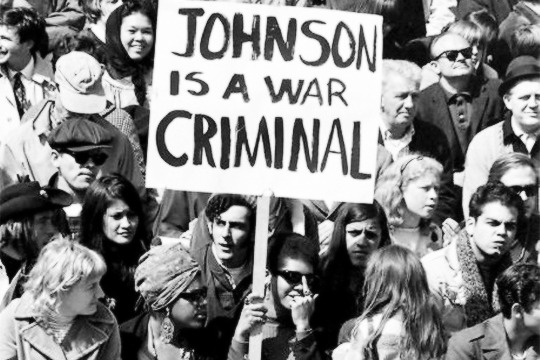
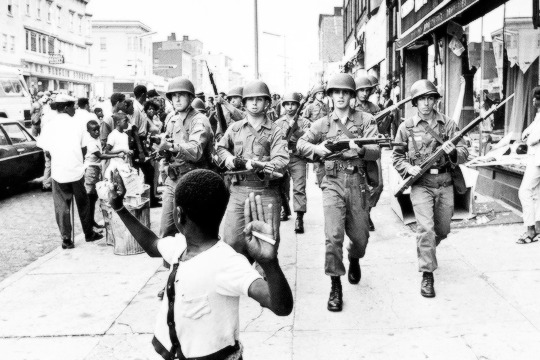

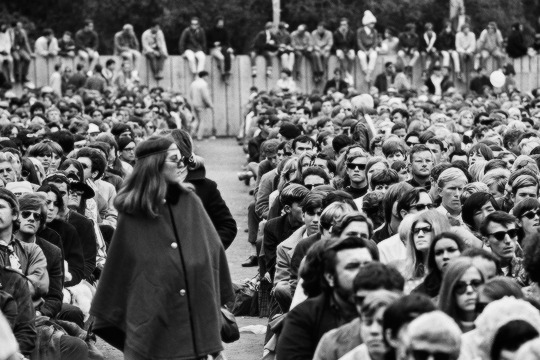


1967
The continued presence of American troops increased further and a total of 475,000 were serving in Vietnam. The peace rallies were multiplying as the number of protesters against the war increased. In the middle east, Israel also went to war with Syria, Egypt and Jordan in the six-day war, and when it was over Israel controlled and occupied a lot more territory than before the war. In the summer, cities throughout America exploded in rioting and looting, the worst being in Detroit on July 23, where 7,000 national guards were bought in to restore law and order on the streets. In England, a new type of model became a fashion sensation by the name of Twiggy, and miniskirts continued to get shorter and even more popular. Also during this year, new discotheques and singles bars appeared across cities around the world, and the Beatles continued to reign supreme with the release of Sgt. Pepper’s Lonely Hearts Club Band. 1967 was coined the “Summer of Love” when young teenagers got friendly, smoked pot and grooved to the music of the Grateful Dead, Jefferson Airplane and the Byrds. The movie industry moved with the times and produced movies that would appeal to this younger audience, including The Graduate, Bonnie and Clyde, and Cool Hand Luke. TV shows included The Fugitive and The Monkees, and color television sets became popular as the price came down and more programs were made in color.
Major events
• Arab forces attack Israel, beginning the Yom Kippur War.
• Ariel-3, the first all-British made satellite, was launched into an orbit around the Earth during May. The satellite was launched with the help of NASA from the Vandenberg Air Force Base in California, and it carried five experiments from British universities. The experiments measured atmospheric noise, high altitude oxygen levels, low frequency radiation, medium frequency waves, and electron density and temperature. After its launch it orbited the Earth every 95 minutes and relayed data back to the United Kingdom until 1970, when it re-entered Earth’s atmosphere.
• The first successful human-to-human heart transplant takes place in December. Dr. Christiaan Barnard performed the operation on the 53-year-old patient Louis Washkansky. The operation took place at the Groote Schuur Hospital in Cape Town, South Africa. The transplant was successful and Washkansky’s body did not reject the organ, although he did die just 18 days later due to double pneumonia brought on by the immunosuppressive drugs that he had to take. After the success, Barnard continued to perform successful heart transplants with the survival times of patients increasing gradually as technology advanced.
• The arguments in the Loving v. Virginia case were argued at the U.S. Supreme Court in April. The case centered on Mildred Jeter and Richard Loving, an interracial couple from Virginia that got married in Washington, D.C., in the late 1950s. When they went back to Virginia they were charged with breaking the state’s law which banned interracial marriage and were jailed. The Lovings sued the state of Virginia and argued that the ban violated the Fourteenth Amendment and was unconstitutional. In June, the Supreme Court ruled in a 6-3 decision that state bans on interracial marriage were unconstitutional and that they were solely based on racial discrimination. The decision made interracial marriage legal throughout the United States.
• The publication of Ralph Nader’s book Unsafe at Any Speed puts pressure on the government and the automobile industry to improve safety in cars.
• Thurgood Marshall becomes the first black justice on the U.S. Supreme Court.
• Pirate radio stations become illegal.
• On March 18, the SS Torrey Canyon supertanker runs aground off the South of England, causing a large oil spill and ecological disaster. The tanker leaked over 100,000 tons of crude oil into the sea. The oil reached the coasts of the Channel Islands and France, and the oil slick spanned about 270 square miles. The spill was the worst in history at that time and prompted tighter international regulations for ships.
• NASA launches the Lunar Orbiter 3 spacecraft.
• Gibraltar holds referendum on staying with Britain or joining Spain.
• The Beatles release Sgt. Pepper’s Lonely Hearts Club Band, one of rock’s most acclaimed albums.
• The Expo 67 begins during April in Montreal, Canada.
• The town of Winneconne in the state of Wisconsin declares its sovereignty in July.
• The first issue of Rolling Stone magazine is released.
• Dr. James H. Bedford became the first person to be cryonically preserved after his death in January. Bedford, a 73-year-old psychology professor who died of kidney cancer, asked to be preserved with the hope that he could be revived in the future. He was frozen within hours of his death by the Cryonics Society of California. Robert Prehoda, Dr. Dante Brunol, Robert Nelson, and Dr. Renault Able all took part in the process, during which Bedford’s body was injected with chemicals meant to help preserve him better in cold temperatures, stored in a “cryocapsule” and kept in a bath of liquid nitrogen at -196º C. He has remained at the Alcor Life Preservation Foundation since 1982, after being transferred to several different facilities.
• A series of tornadoes strike the Chicago area, killing more than 60 people and creating millions of dollars worth of damage.
• The 25th Amendment to the Constitution, which deals with succession to the Presidency, is ratified.
• Teachers go on strike throughout the U.S., demanding pay increases to keep pace with inflation.
• Cassius Clay is stripped of his heavyweight title for refusing induction into the U.S. Army.
• The RMS Queen Elizabeth II is launched by Cunard.
• Francis Chichester arrives back in Plymouth, after sailing round the world single-handed.
• President Lyndon B. Johnson asks for a 6% increase on taxes to support the Vietnam War.
• The Public Broadcasting Act establishes the Corporation for Public Broadcasting (CPB).
• Inflation costs of living range from 1.8% to 5.8%.
• Biafra proclaims its independence from Nigeria.
• Race riots break out in a number of cities in the U.S., including Cleveland, Newark, and Detroit.
• United Kingdom and Ireland apply officially for EEC membership.
• Typhoon Emma leaves 140,000 homeless and more than 300 dead.
• The People’s Republic of China tests its first hydrogen bomb.
• Britain devalues the pound by lowering the exchange rate from $2.80 to $2.40.
• The British Road Safety Act, which allows for the use of the “breathalyser” to detect motorists over the legal limit of alcohol, goes into effect.
• 40,000 anti-Vietnam war protesters fill the Kezar Stadium in San Fransisco, California.
• U.S. Navy pilot John McCain is shot down in his A-4 over North Vietnam and spends 5 ½ years in prison.
• A soccer riot in Sivas, Turkey, kills 41 people.
• The Monterey International Pop Festival in California features ‘60s music icons including Jimi Hendrix, The Who, Janis Joplin, The Steve Miller Band, Simon & Garfunkel, and the Grateful Dead.
• Otis Reading dies in a plane crash, aged 26.
• Barbra Streisand performs on Central Park before an audience of 135,000 people.
• The Carrol Shelby Mustang GT-500 Fastback is released.
• The musical Hair opens off-Broadway.
Top 10 highest-grossing films in the U.S.
1. The Graduate (dir. Mike Nichols)
2. The Jungle Book (dir. Wolfgang Reitherman)
3. Guess Who’s Coming to Dinner (dir. Stanley Kramer)
4. Bonnie and Clyde (dir. Arthur Penn)
5. The Dirty Dozen (dir. Robert Aldrich)
6. Valley of the Dolls (dir. Mark Robson)
7. You Only Live Twice (dir. Lewis Gilbert)
8. To Sir, with Love (dir. James Clavell)
9. The Born Losers (dir. T. C. Frank)
10. Thoroughly Modern Millie (dir. George Roy Hill)
Billboard’s number-one music albums (in chronological order)
1. “The Monkees” by The Monkees
2. “More of The Monkees” by The Monkees
3. “Sounds Like…” Herb Alpert and the Tijuana Brass
4. “Headquarters” by The Monkees
5. “Sgt. Pepper’s Lonely Hearts Club Band” by The Beatles
6. “Ode to Billie Joe” by Bobbie Gentry
7. “Diana Ross & the Supremes: Greatest Hits” by The Supremes
8. “Pisces, Aquarius, Capricorn & Jones Ltd.” by The Monkees
Source: [x]
109 notes
·
View notes
Text
308J. William Salmon 1644-1713
The family-dictionary; or, Household companion: Containing, in an alphabetical method, I. Directions for cookery, in dressing flesh, fowl, fish, herbs, boots, &c. Seasoning, making sauces, bills of fare, art of carving, &c. II. Making all sorts of pastry ware, and things made of meal, flower, whether bak’d, boyled, or fried, &c. III. Making of conserves, candies, preserves, confects, lozenges, gellies, creams, pickles, &c. IV. The making all kinds of potable liquors, … English wines of cherries, currants, gooseberries, raspberries, &c. Cyder, cyder-royal, usquebaugh, cordial waters. V. The making of all sorts of rare perfumes, sweet balls, pouders, admirable washes, beautifying waters, oils, essences, pomatums. VI. The virtues and uses of the most usual herbs and plants, their roots, barks, leaves, flowers, fruits, seeds, used in physick. VII. The preparations of several choice medicines, … The second edition, corrected, and much enlarged. By William Salmon, professor of physic.
London: Printed for H. Rhodes, at the Star, the corner of Bride-lane, in Fleet-street: and sold by R. Clavel at the Peacock against St. Dunstan’s Church in Fleetstreet 1696. $2,800
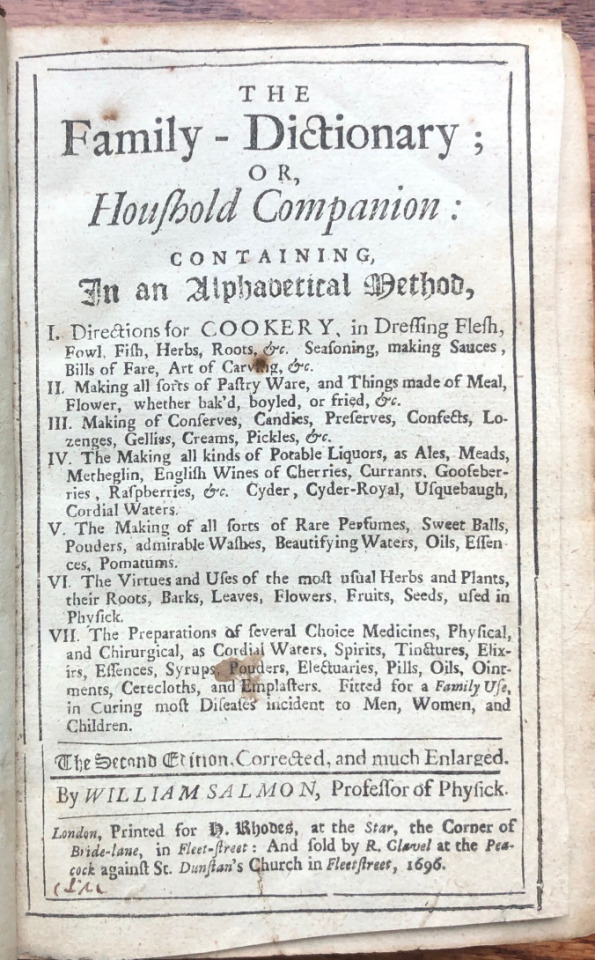
Identified as Wing S429 on UMI microfilm set “Early English books, 1641-1700”, reel 1339.
Octavo 7 X 4 ½ inches A4, B-Z8,Aa-Cc8./ Lacking O4&5– Errata on p. 393./ Publisher’s advertisements last 7 unnumbered pages. This copy is bound in its original full calf , a very nice copy in original condition.
Estc shows only one US copy At the Folger. [see below] Wing S-429
The enclyopedic nature of this book manages for some rather interesting Juxtapositions of descriptions of necessary things to know of. For example Lump or Ling=Pye (a wonderful pasterie ) and next we have Lunacy ( which is a distemper first seated in the blood and then afflicting the brain).. and there are some long descriptions of and uses for rather obscure substances, Bezorattic=Powder (a highly esteemed thing)
And ofcourse there is Aqua Mirabilis, Aqua Epidemica, Scurvigras=wine, Tetters to kill: And on and on!
William Salmon according to an inscription under his portrait in Ars Anatomica (1714), William Salmon was born on 2 June 1644 Almost nothing is known about his upbringing or his education. He may have traveled in New England or the West Indies {Osler, Bibliotheca Osleriana } It was rumored that his earliest teacher was a traveling charlatan from whom he inherited his original stock-in-trade.
Salmon set up in business near the Smithfield gate of St. Bartholomew’s Hospital in London, where he could attract patients who did not receive treatment at the hospital.
He treated diseases, compounded and sold prescriptions, cast horoscopes, and studied alchemy, all “form[s] of medical practice common at the time”. In 1684, Salmon moved to the Blue Balcony by the ditch side, near Holborn Bridge, living there until 1692 By 1698, when he published Ars chirurgica, he indicated that his residence was the Great House by Black Friars’ Stairs.
Salmon’s published works covered an incredibly wide range of topics, including pharmacology, medicine, surgery, alchemy, chiromancy, astrology, almanacs, botany, cooking, and art. In part, he was able to publish so prolifically because large sections of his texts were “copied, translated, abridged, enlarged and compiled from the texts of others”.
Salmon openly acknowledged that much of his work was derivative, stating “we have scrutinized the best Authors, to many of which we have been very much beholden”, with an extensive list of members of the Mathematical, Medical, and Chyrurick Tribes, as well as Anatomists, chymists, and a multitude of others. Even by the standards of his time, he was criticized for failing to individually credit the sources from which specific materials were taken. In addition, instead of taking a specific philosophical position and siding with one of the competing schools of medical thought, Salmon created “a compendium of everything”. The publication history of his books is complicated, as subsequent editions of a title often added more and more material. For example, the 1701 edition of Polygraphice was almost three times the length of the first edition.
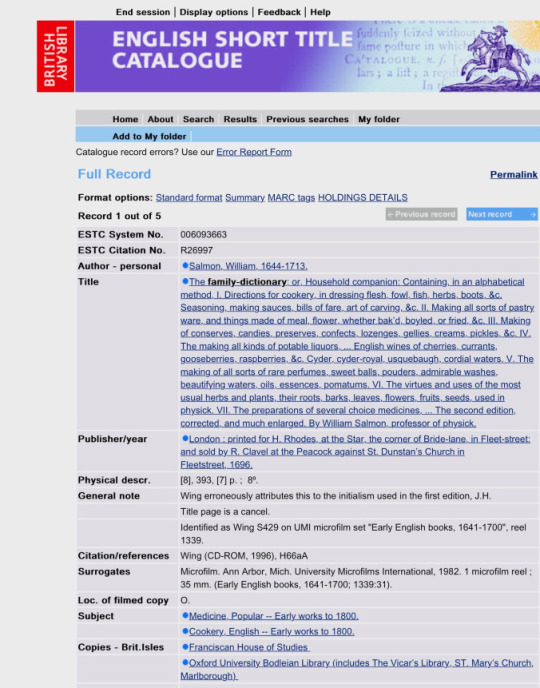
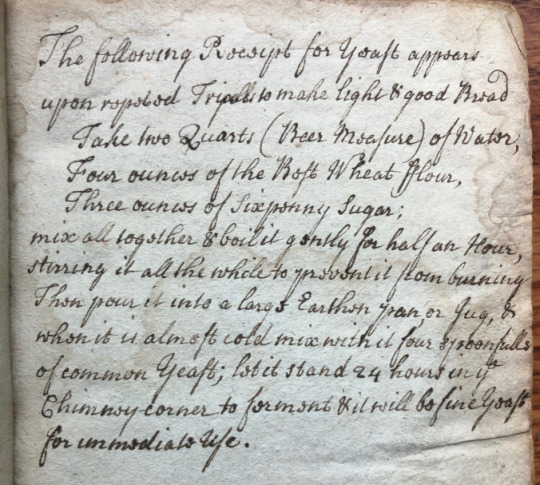
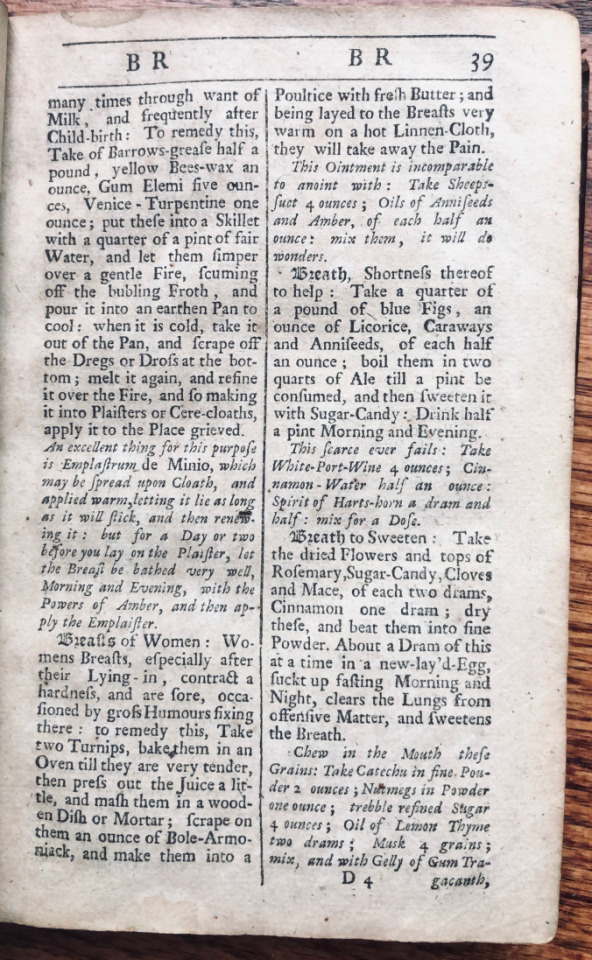
Household companion: 308J. William Salmon 1644-1713 The family-dictionary; or, Household companion: Containing, in an alphabetical method, I. Directions for cookery, in dressing flesh, fowl, fish, herbs, boots, &c.
0 notes